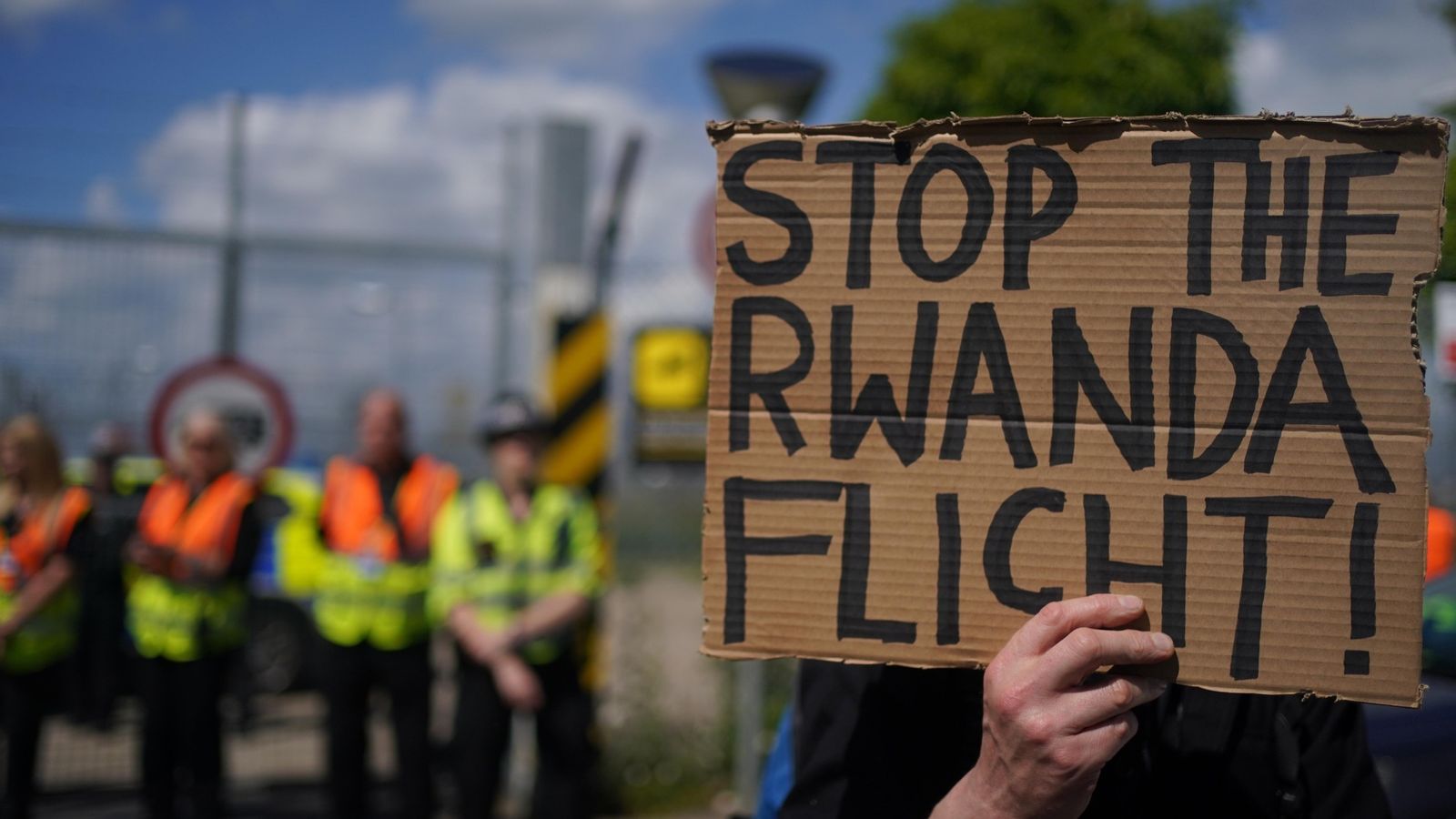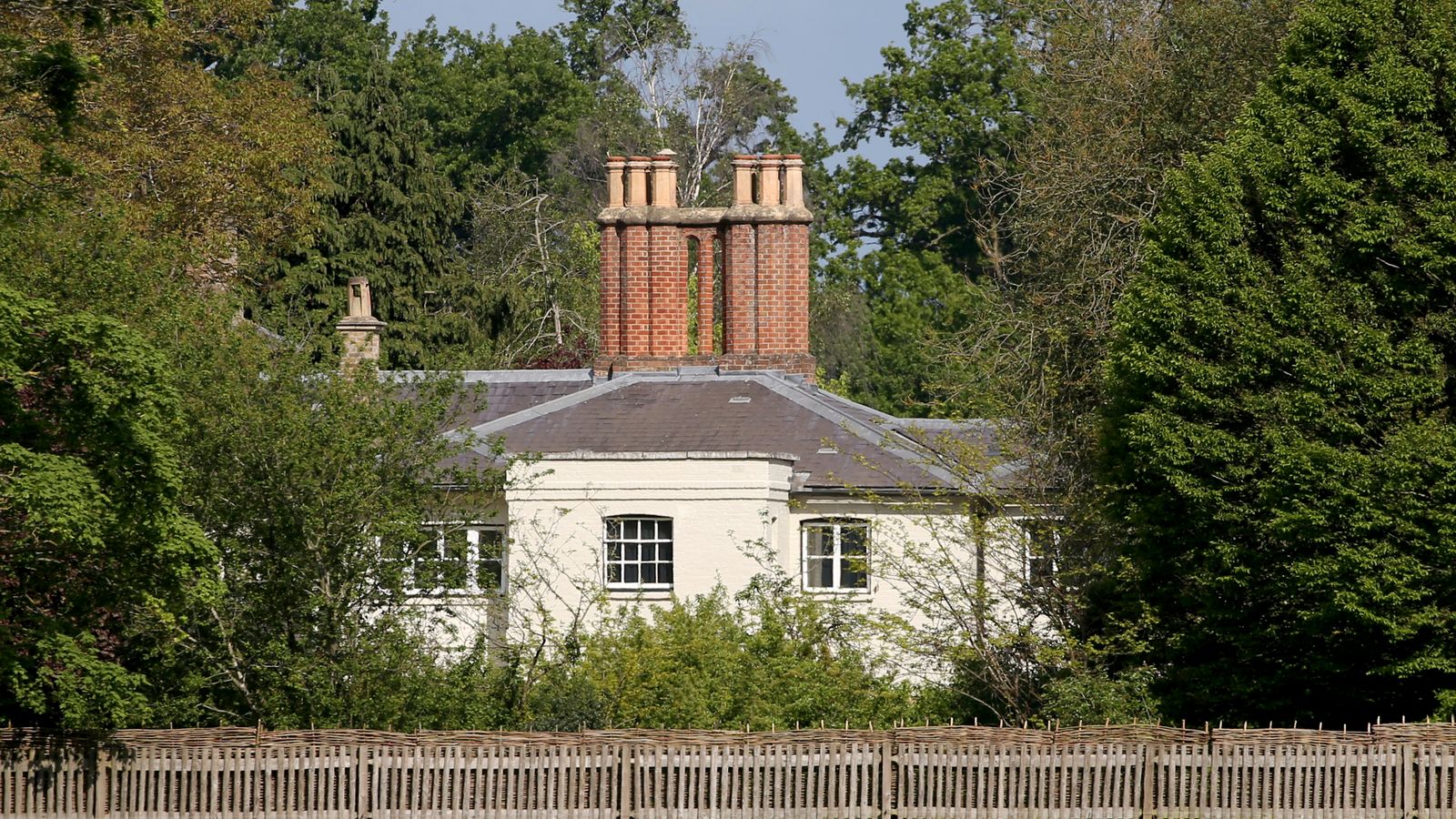Campaigners and asylum seekers have won a Court of Appeal challenge over the government’s planned Rwanda deportation scheme.
Three judges have overturned a High Court ruling that previously said the east African nation could be considered a “safe third country” for migrants to be sent to.
It is the latest court verdict in a long-running legal battle to get the controversial scheme up and running, after it was announced last April as part of plans to crack down on Channel crossings.
Announcing the ruling, Lord Chief Justice Lord Burnett said he does not accept that migrants would be at risk of removal to their home countries from Rwanda – but it is not a safe place for them to housed in while their asylum claims are processed.
Politics latest: Ex-ministers singled out for ‘most vociferous attacks’ on Johnson probe
The judge concluded: “The result is that the High Court’s decision that Rwanda was a safe third country is reversed, and unless and until the deficiencies in its asylum process are corrected, removal of asylum seekers will be unlawful.”
The Rwandan government said it took “issue” with the ruling, calling the nation “one of the safest countries in the world”.
Politics latest: Rwanda ‘not safe country’, rules judge; ex-ministers launched ‘vociferous attacks’ on Johnson probe
Nadine Dorries and Jacob Rees-Mogg among 10 named in privileges committee special report on partygate probe
Thames Water concerns: ‘Absolutely nothing’ will happen with customers’ bills, says minister
Government spokeswoman Yolande Makolo said: “While this is ultimately a decision for the UK’s judicial system, we do take issue with the ruling that Rwanda is not a safe country for asylum seekers and refugees. Rwanda is one of the safest countries in the world and we have been recognised by the UNHCR and other international institutions for our exemplary treatment of refugees.”
She said her government was “still committed” to making the partnership work, adding: “The broken global migration system is failing to protect the vulnerable, and empowering criminal smuggling gangs at an immeasurable human cost.
“When the migrants do arrive, we will welcome them and provide them with the support they’ll need to build new lives in Rwanda.”
Lord Burnett said the court reached its conclusion on the law and took “no view whatsoever” about the political merits of the policy.
“Those are entirely a matter for the government, on which the court has nothing to say,” he added.
Lord Burnett, who heard the appeal with Sir Geoffrey Vos and Lord Justice Underhill, said the court ruled by a majority and he had agreed with a previous High Court ruling – but the two others did not.
In December last year, two judges at the High Court dismissed a series of legal bids against the plans, finding the Rwanda proposals were consistent with the government’s legal obligations.
However, lawyers for some individual asylum seekers and the charity Asylum Aid brought the successful challenge against their decision at the Court of Appeal.
The latest ruling was welcomed by Green MP Caroline Lucas who tweeted: “Excellent news that Court of Appeal has ruled Braverman’s utterly inhumane, grotesquely immoral & totally unworkable #Rwanda scheme to be illegal too – & in clear breach of human rights law. Time for an asylum policy which treats people with respect & dignity.”
However Tory MP Simon Clark said the judgement is “deeply disappointing” and “I would anticipate an immediate appeal to the Supreme Court”.
The government wants to send tens of thousands of migrants more than 4,000 miles away to Rwanda as part of a £120m deal agreed with the government in Kigali last year.
The policy was introduced under Boris Johnson but has been pushed forward by his successors as part of their plans to tackle small boat crossings in the Channel.
Political correspondent
Rishi Sunak has staked his premiership on a promise to ‘stop the boats’.
Whilst Suella Braverman has said that deporting migrants to Rwanda is her “dream”.
But like those that came before them, this prime minister and his home secretary have found themselves locked in court battles over this controversial policy, yet to get it off the ground.
Today, they have hit yet another legal brick wall, with the court of appeal ruling it unlawful.
This pushes back their original ambition to see flights this summer, and will likely now go to the Supreme Court.
With a general election on the horizon, the Prime Minister is desperate to demonstrate progress on this issue before voters head to the ballot boxes.
That said, if the threat of deportation continues to be ineffective at deterring channel crossings, the legal log jam could become a convenient political excuse.
However, no one has made the journey yet.
A flight was stopped at the eleventh hour in June last year after an appeal to the European Court of Human Rights.
Campaigners have said the policy is “cruel and will cause great human suffering”, and fought through the courts to stop it from happening.
But the government argues the current system “incentivises” people to make dangerous journeys across the Channel and doing nothing is “not an option”.









